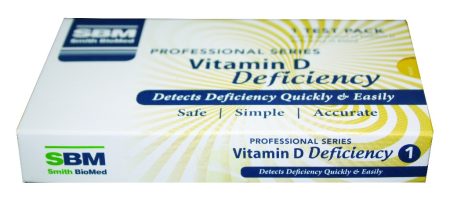![]() Test cassette
Test cassette![]() Capillary dropper
Capillary dropper![]() Buffer
Buffer![]() Alcohol pad
Alcohol pad![]() Lancet
Lancet![]() Instruction leaflet
Instruction leaflet![]() Colour card
Colour card
Key reasons we need Vitamin D
Bone Health
Vitamin D is essential for the absorption of calcium in the intestines. Calcium is a key mineral needed for bone health. Without adequate Vitamin D levels, the body struggles to absorb calcium leading to weakened bones.
Immune System Support
Vitamin D is known to modulate the immune system. It helps in the production of antimicrobial peptides and enhances the pathogen-fighting properties of monocytes and macrophages.
Mood Regulation
There’s emerging research suggesting a connection between Vitamin D and mood regulation. Some studies indicate that adequate levels may lower risk of depression and could help cognitive function.
Heart Health
Vitamin D may contribute to cardiovascular health by helping to regulate blood pressure and reduce inflammation. Some studies suggest a correlation between Vitamin D deficiency and an increased risk of heart disease.
Muscle Function
Vitamin D is required in the regulation of muscle function. Deficiency can lead to muscle weakness and pain. Maintaining adequate levels of it is particularly important for older adults to prevent falls and fractures.
Cancer Prevention
Some studies suggest that Vitamin D may help reduce the risk of cancers, including breast, prostate, and colorectal cancers. However, more research is needed to establish a definitive link.
Regulation of Gene Expression
Vitamin D influences the expression of numerous genes involved in various physiological processes, including cell growth, differentiation, and apoptosis (programmed cell death).
Autoimmune Diseases
Vitamin D has been implicated in the development and progression of autoimmune diseases. Adequate levels may help modulate the immune response and reduce the risk of autoimmune disorders.
Pregnancy and Foetal Development
Vitamin D is crucial during pregnancy for proper foetal development and the development of bones and a healthy immune system in the baby.
Skin Health
It may have a positive impact on skin conditions, like psoriasis and eczema, due to its anti-inflammatory effects.
How to get Vitamin D
Ensuring sufficient Vitamin D levels is critical for overall health and well-being. While sunlight is a natural source, it’s important to balance sun exposure with safety measures like sunscreen and, in some cases, supplementation.
Individuals with limited sun exposure, darker skin tones, or certain medical conditions may be at a higher risk of Vitamin D deficiency and should consult with healthcare professionals for guidance.
Maintaining a healthy lifestyle, including a balanced diet and regular exposure to sunlight, can contribute to optimal overall health.
It’s found in relatively few foods, and it can also be synthesised by the body when the skin is exposed to sunlight.
Fatty Fish:
- Salmon
- Mackerel
- Sardines
- Trout
- Herring
Cod Liver Oil: This is one of the most potent sources of it.
Egg Yolks: While the content in eggs is not extremely high, it’s present in the yolk.
Mushrooms: Some types of mushrooms, such as shiitake and maitake when exposed to ultraviolet (UV) light.
Fortified Foods: Many foods are fortified with Vitamin D, especially in regions where sunlight exposure is limited. Commonly fortified foods include:
- Fortified milk
- Fortified orange juice
- Fortified cereals
- Fortified tofu
If you have difficulty obtaining enough Vitamin D from sunlight and food sources, or if you have specific dietary restrictions, you may consider Vitamin D supplements under the guidance of a healthcare professional. It’s important to strike a balance, as excessive Vitamin D intake can also have adverse effects on health.
Potential implications of a Vitamin D deficiency
It is crucial for several physiological functions in the body, and its absence or deficiency can lead to various health issues, particularly in older people. While you can survive for a period without sufficient levels of it, its long-term absence can have serious consequences.
- Bone Health Issues: A deficiency can lead to weakened bones, increased risk of fractures, and conditions like osteoporosis in the long term.
- Muscle Weakness and Pain: deficiency can contribute to muscle weakness and pain. This may increase the risk of falls, especially in older adults.
- Impaired Immune Function: A deficiency may compromise the immune response, potentially increasing the risk of infections and autoimmune disorders.
- Mood Disorders: Inadequate levels may contribute to mental well-being declining.
- Increased Risk of Chronic Diseases: deficiency has been associated with an increased risk of various chronic conditions, including cardiovascular diseases, certain cancers, and autoimmune disorders.
- Pregnancy Complications: Insufficient Vitamin D during pregnancy can affect fetal development and may contribute to complications such as skeletal deformities in the baby.
While it’s possible to survive without an immediate and severe impact from a short-term Vitamin D deficiency, the long-term consequences can be significant. Sunlight exposure, food and supplements like cod liver oil are common sources of Vitamin D.
It’s important to note that individual needs vary, and factors such as age, skin type, geographical location, and health conditions can influence the body’s ability to produce or absorb Vitamin D. If you suspect a deficiency, it’s advisable to consult with a healthcare professional for appropriate guidance and treatment.



